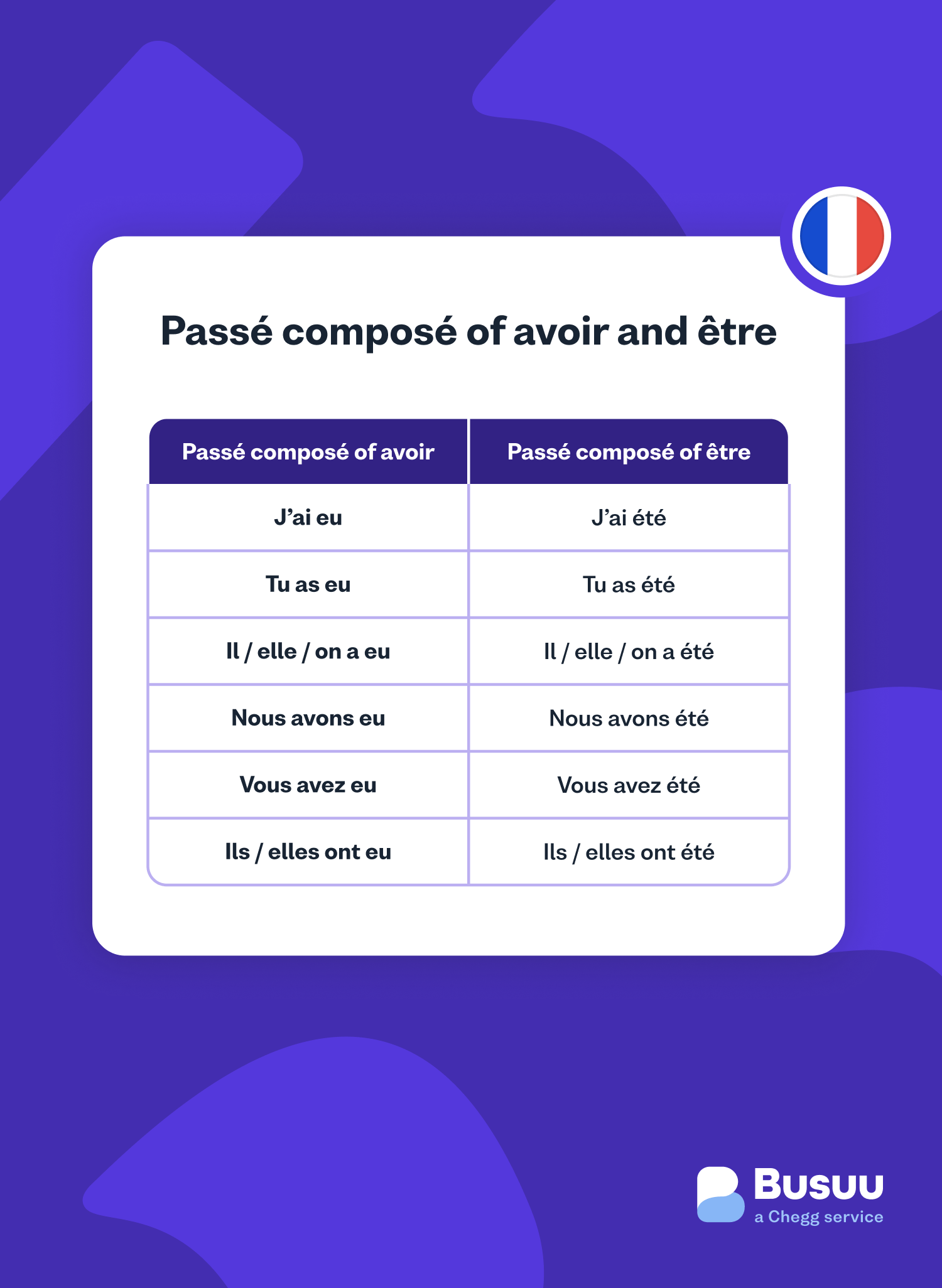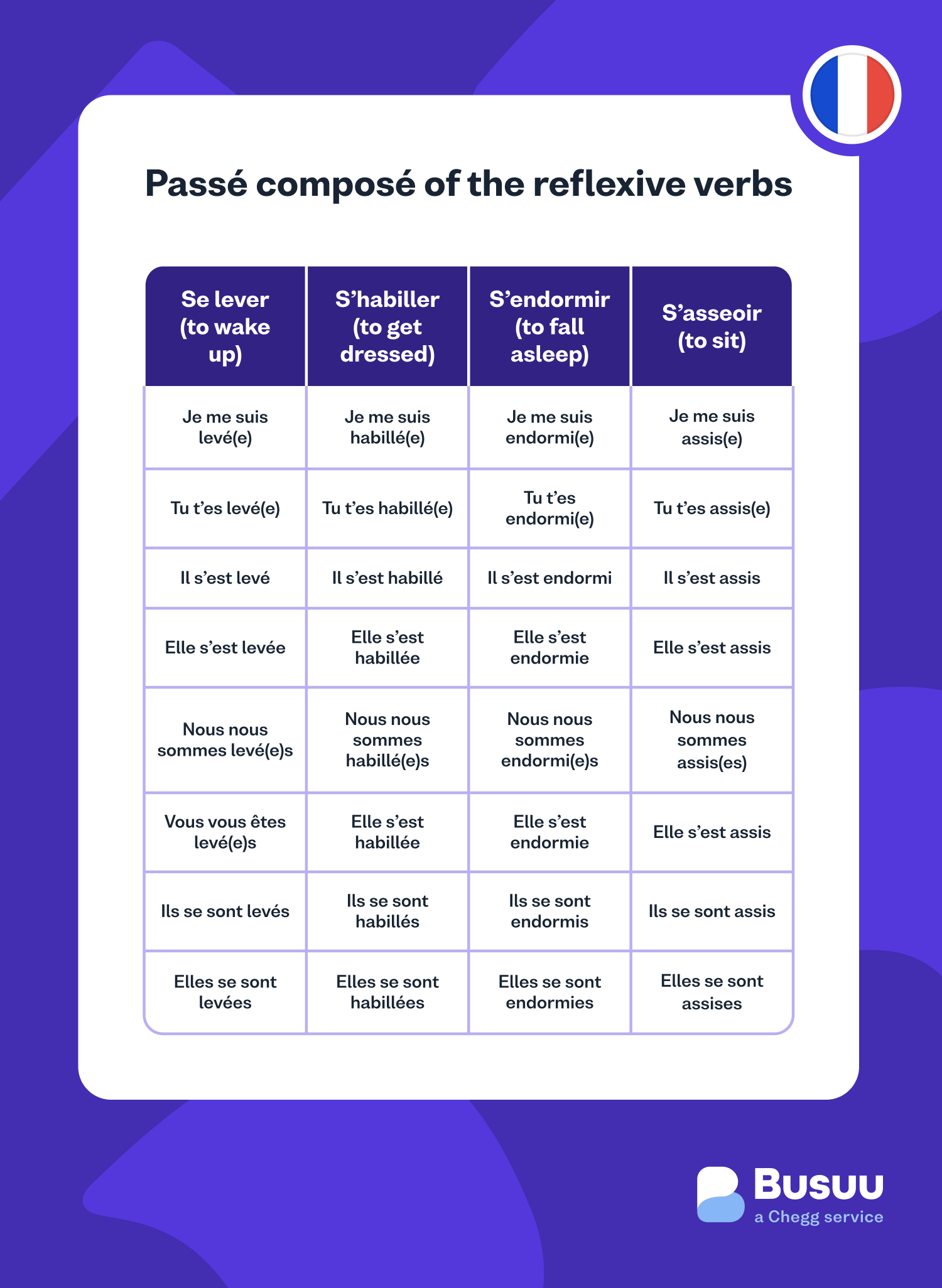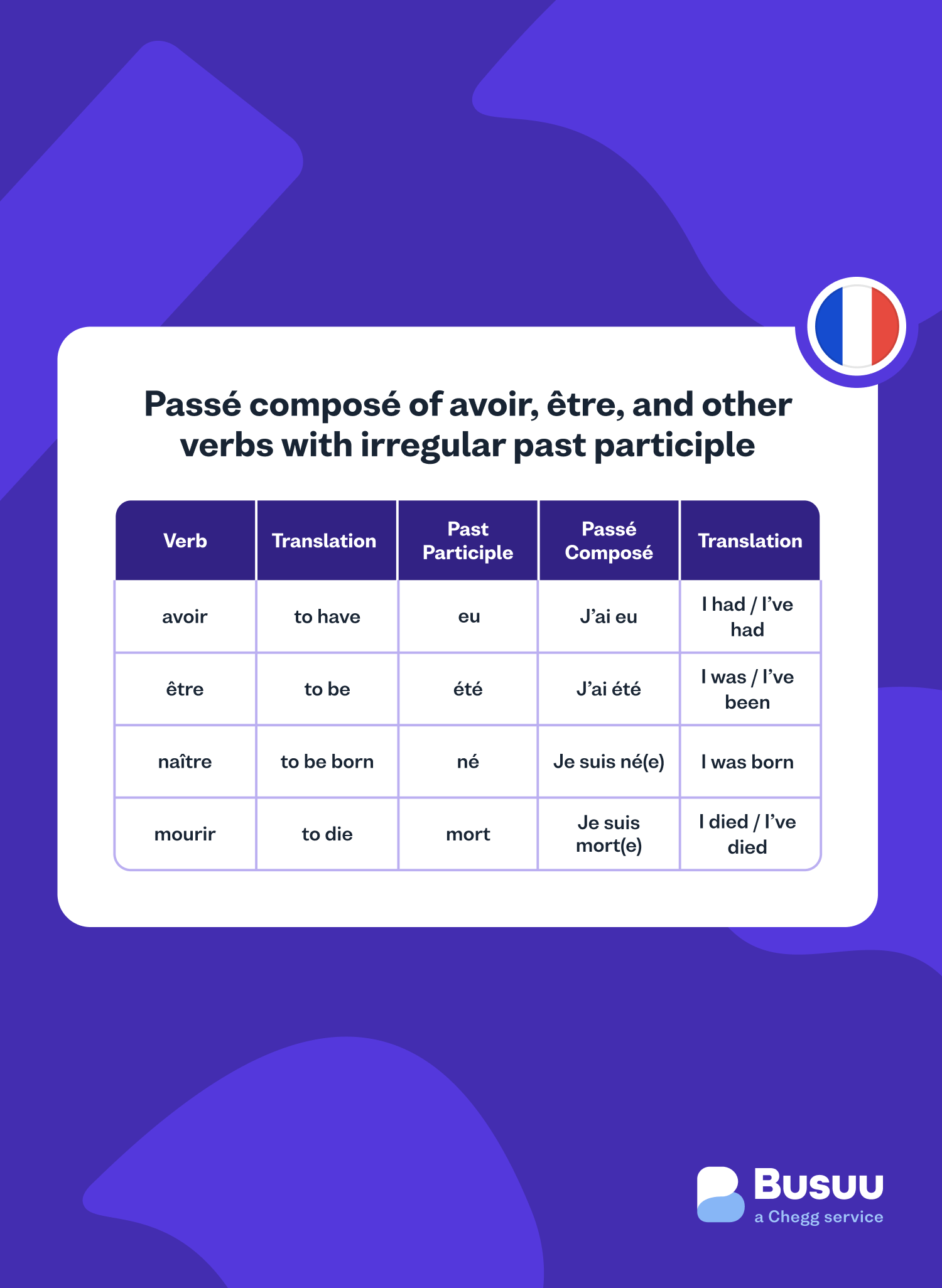Mastering the French Passé Composé
A practical guide to form, conjugate and use the French passé composé of regular and irregular verbs.
I want to learn...
When you study a foreign language, learning to speak in the past tense is a major step towards proficiency. In French, this means first of all acquainting yourself with the passé composé!
Before then, your topics of conversation are limited to things that can be expressed through the present tense - likes, dislikes, habits, descriptions… But when you add the past tense(s) to your repertoire, a world of possibilities opens up - you can talk about your life story, relate events in the past, describe an incident or an adventure or a holiday, but also talk about a film or a book that you liked.
Therefore, acquiring the resources to speak about the past marks a real turning point in the journey towards mastering a foreign language.
Past tense(s)
Languages have systems of verb tenses, so there is never just one tense to talk about the past. In English, for example, we use mainly the simple past (e.g. I did, I went, I saw) and the present perfect (e.g. I've done, I've gone, I've seen) to talk about the past - but there are other tenses that complete the system, like the present perfect continuous (I’ve been doing, I’ve been going, I’ve been seeing), and the past perfect (I had done, I had gone, I had seen).
Passé composé vs. imparfait
In French the two main tenses that are used, in combination, to talk about the past are the passé composé (e.g. j’ai fait, je suis allée, j’ai vu) and the imparfait (e.g. je faisais, j’allais, je voyais).
The passé composé is a perfect tense, meaning that it's used to talk about events that are finished and completed in the past. It’s useful to know that the passé composé almost entirely replaces the more formal passé simple in speech (e.g. je fis, j’allai, je vis), as this is now predominantly used in writing - this is good news, as the passé simple, despite its name, is an extremely complex tense!
When to use passé composé vs imparfait
The most important difference when speaking about the past in French is between passé composé and imparfait. It is not completely straightforward to understand when to use passé composé as opposed to imparfait, because English has a different way of distinguishing between the tenses. In fact, passé composé can correspond to both simple past and present perfect in English, depending on the sentence, as you can see in the examples:
-
I've already seen this film (present perfect) - J'ai déjà vu ce film.
-
I went to the shop (simple past) - Je suis allé(e) au magasin.
In general, the passé composé is used to express:
1. Events or actions completed in the past
- Hier j’ai fait les courses - Yesterday I did the shopping.
2. Events or action with a clear duration
- Emma a vécu à Paris de 2010 à 2015. - Emma has lived in Paris from 2010 to 2015.
3. A sequence of actions or events
- J’ai cuisiné, j’ai mangé, et ensuite j’ai fait la vaisselle. - I cooked, I ate, and then I did the washing up.
On the other hand, the imparfait is used for:
1. Descriptions of people, things, states, or situations in the past
-
Elle avait les cheveux blonds et les yeux bleus. - She had blond hair and blue eyes.
-
Il était deux heures du matin, il pleuvait et il faisait froid. - It was 2 in the morning, it was raining and it was cold.
2. Past habits or repeated actions in the past
- Chaque matin je me levais à 7 heures, je buvais un café et j’allais au travail. - Every morning I used to wake up at 7, drink a coffee and go to work.
The formation of passé composé
Let’s move to the conjugation of passé composé. The passé composé is a compound tense, which means that it is made up of two words: the auxiliary verb (or "helping verb") and the past participle. See the table below to better understand what these are.
The auxiliary verb and the past participle
| Subject | Auxiliary verb | Past participle | Rest of the sentence |
|---|---|---|---|
| J’ | ai | mangé | au restaurant. |
| Il | est | parti | en vacances. |
| Nous | avons | vu | nos amis. |
As you can see in the examples, the auxiliary verb is the first part of the passé composé and comes right after the subject. In French there are two possible auxiliary verbs: avoir and être.
In the passé composé, the auxiliary verb has to be conjugated in the present tense and always agree with the subject, i.e. change according to the person it refers to, as in the following examples:
- J’ai mangé (I have eaten)
- Tu as mangé (you have eaten)
- Il a mangé (he has eaten), etc.
Here's a quick revision of the present tense of avoir and être, which you will absolutely need to know par coeur (by heart) in order to be able to form the passé composé!
The present tense of the auxiliary verbs avoir and être
| Present tense of avoir | Present tense of être |
|---|---|
| J’ai | Je suis |
| Tu as | Tu es |
| Il / elle / on a | Il / elle / on est |
| Nous avons | Nous sommes |
| Vous avez | Vous êtes |
| Ils / elles ont | Ils / elles sont |
Tip: Need a refresher of the main rules of French verb conjugation? Check out our article!
Avoir or être
One of the most difficult things about the passé composé is when to use the auxiliary verb avoir and when to use être. There isn’t always a way to tell whether a verb needs one or the other, but there are some rules that make the choice much easier.
When to use auxiliary verb avoir
The vast majority of verbs use avoir as an auxiliary verb. It can help to know that every time the verb has a direct object, the auxiliary verb will be avoir. To put it simply, a direct object is an object that, related to the verb, answers the question “what?” or “who?”.
-
J’ai acheté le journal. - I bought the newspaper. I bought what? The newspaper (direct object - auxiliary verb avoir).
-
Ils ont invité quelques amis. - They have invited some friends. They have invited who? Some friends (direct object - auxiliary verb avoir).
-
Elle a mangé une pizza. - She ate a pizza. She ate what? A pizza (direct object - auxiliary verb avoir).
Avoir is also the auxiliary verb of the two most important verbs: avoir and être themselves! For their conjugation, see the table below.
 )
)
Passé composé of avoir and être
| Passé composé of avoir | Passé composé of être |
|---|---|
| J’ai eu | J’ai été |
| Tu as eu | Tu as été |
| Il / elle / on a eu | Il / elle / on a été |
| Nous avons eu | Nous avons été |
| Vous avez eu | Vous avez été |
| Ils / elles ont eu | Ils / elles ont été |
When to use auxiliary verb être
A category of verbs that only uses être as the auxiliary verb is reflexive verbs, i.e. verbs that are accompanied by a reflexive pronoun (me, te, se, nous, vous).
Some of the most common French reflexive verbs are:
- se coucher (to go to bed)
- s’habiller (to get dressed))
- se lever (to get up), se réveiller (to wake up))
- se promener (to take a walk))
- se fâcher (to get angry))
- s’amuser (to have fun))
- se fatiguer (to get tired))
- s’endormir (to fall asleep))
- s’asseoir (to sit)
Passé composé of reflexive verbs
When conjugating reflexive verbs in the past tense, you need to follow the structure:
subject + pronoun + auxiliary verb être + past participle
Refer to the following examples:
- Je me suis couché tôt hier soir - I went to bed early last night.
- Elle s’est réveillée à 7 heures. - She woke up at 7.
- Ils se sont amusés à la fête. - They had fun at the party.
In the table below you will find the passé composé conjugation of some of the most common reflexive verbs.

Passé composé of the reflexive verbs se lever, s’habiller, s’endormir and s’asseoir
| Se lever (to wake up) |
S’habiller (to get dressed) |
S’endormir (to fall asleep) |
S’asseoir (to sit) |
|---|---|---|---|
| Je me suis levé(e) | Je me suis habillé(e) | Je me suis endormi(e) | Je me suis assis(e) |
| Tu t’es levé(e) | Tu t’es habillé(e) | Tu t’es endormi(e) | Tu t’es assis(e) |
| Il s’est levé | Il s’est habillé | Il s’est endormi | Il s’est assis |
| Elle s’est levée | Elle s’est habillée | Elle s’est endormie | Elle s’est assise |
| Nous nous sommes levé(e)s | Nous nous sommes habillé(e)s | Nous nous sommes endormi(e)s | Nous nous sommes assis(es) |
| Vous vous êtes levé(e)s | Vous vous êtes habillé(e)s | Vous vous êtes endormi(e)s | Vous vous êtes assis(es) |
| Ils se sont levés | Ils se sont habillés | Ils se sont endormis | Ils se sont assis |
| Elles se sont levées | Elles se sont habillées | Elles se sont endormies | Elles se sont assises |
You have probably guessed that the optional “e” and/or “s” in the past participle depends on whether the subject is masculine or feminine, singular or plural. You will find a detailed explanation of this in the section on the past participle below.
But now, let’s look at other verbs that take the auxiliary verb être.
Verbs of “displacement”
Another category of verbs that take the auxiliary verb être is what we call verbs of “displacement”, i.e. verbs that express movement or a change of state. This is not a hard and fast rule, i.e. not all verbs of movements or change of state take auxiliary être, but most of them do. The most important ones that you need to remember are: naître (to be born), mourir (to die), devenir (to become), rester (to stay), passer (to pass/go past), aller (to go), partir (to leave), venir (to come), arriver (to arrive), entrer (to go in/enter), sortir (to go out/exit), rentrer (to go back in/return), retourner (to go back/return), and tomber (to fall).
A widely-known strategy that might help you memorize the main verbs that take the auxiliary verb être is to think of the anagram Dr & Mrs Vandertramp - each letter is the first letter of one of these verbs, as you can see in the table below.
Passé composé of verbs of “displacement”: Dr & Mrs Vandertramp
| Verb | Translation | Passé Composé | Translation |
|---|---|---|---|
| Devenir | to become | je suis devenu(e) | I became / I’ve become |
| Revenir | to come back | je suis revenu(e) | I came back / I’ve come back |
| Monter | to go up / climb | je suis monté(e) | I went up / I’ve gone up / I climbed / I’ve climbed |
| Rester | to stay | je suis resté(e) | I stayed/ I’ve stayed |
| Sortir | to go out / exit | Je suis sorti(e) | I went out / I’ve been out / I exited / I’ve exited |
| Venir | to come | je suis venu(e) | I came / I’ve come |
| Arriver | to arrive | Je suis arrivé(e) | I arrived / I’ve arrived |
| Naître | to be born | je suis né(e) | I was born |
| Descendre | to go down | je suis descendu(e) | I went down / I’ve gone down |
| Entrer | to go in / enter | Je suis entré(e) | I went in / I’ve gone in / I entered / I’ve entered |
| Retourner | to go back / return | Je suis retourné(e) | I went back / I’ve gone back / I returned / I’ve returned |
| Tomber | to fall | Je suis tombé(e) | I fell / I’ve fallen |
| Rentrer | to go back in / return | Je suis rentré(e) | I went back in / I’ve gone back in / I returned / I’ve returned |
| Aller | to go | je suis allé(e) | I went / I’ve gone |
| Mourir | to die | je suis mort(e) | I died / I’ve died |
| Passer | to pass/ go past | je suis passé(e) | I passed / I’ve passed/ I went past / I’ve gone past |
Bear in mind that, as we said, there are some exceptions to this rule - courir (to run), for example, is a verb of movement, but takes the auxiliary verb avoir: J'ai couru (I have run).
Now that you know all about the auxiliary verbs, let's move to the second part of the passé composé: the past participle.
The past participle
The past participle is the second word that makes up the passé composé. Unlike the auxiliary verb, it doesn't have six different forms for the six different persons making up the conjugation - there is only one form, to which you have to add an -e or an -s for feminine and plural (but only in some cases, which we’ll see in detail below).
First things first: how do we form the past participle? Obviously, it depends on the verb. For regular verbs, there are fixed patterns to follow.
Regular verbs in -er
To form the past participle of regular verbs whose infinitive ends in -er, you simply have to remove the ending -er and replace it with an -é, as in the following example:
Aimer (to love) - aimer - J'ai aimé (I loved / I've loved)
This is by far the largest category of regular verbs: think of all those high-usage verbs like aimer (to love), parler (to speak), manger (to eat), arriver (to arrive), travailler (to work), étudier (to study), voyager (to travel), acheter (to buy), entrer (to enter), etc. In the table below, you find the passé composé conjugation of some common regular verbs in -er:
Passé composé of regular verbs in -er parler, manger, and arriver
| Parler (to speak) | Manger (to eat) | Arriver (to arrive) |
|---|---|---|
| J’ai parlé | J’ai mangé | Je suis arrivé(e) |
| Tu as parlé | Tu as mangé | Tu es arrivé(e) |
| Il / elle / on a parlé | Il / elle / on a mangé | Il / elle / on est arrivé(e) |
| Nous avons parlé | Nous avons mangé | Nous sommes arrivé(e)s |
| Vous avez parlé | Vous avez mangé | Vous êtes arrivé(e)s |
| Ils ont parlé | Ils ont mangé | Ils sont arrivé(e)s |
Regular verbs in -ir
To form the past participle of regular verbs whose infinitive ends in -ir, you have to remove the ending -ir and replace it with an -i, as in the example:
Finir (to finish) - finir - J'ai fini (I finished / I've finished)
Some frequently used verbs that belong to this category are finir (to finish), partir (to leave), sortir (to go out/ exit), dormir (to sleep), grandir (to grow up), choisir (to choose), and réussir (to manage / succeed). In the table below, you will find the passé composé conjugation of some common regular verbs in -ir:
Passé composé of regular verbs in -ir finir, partir, and sortir
| Finir (to finish) | Partir (to leave) | Sortir (to go out/exit) |
|---|---|---|
| J’ai fini | Je suis parti(e) | e suis sorti(e) |
| Tu as fini | Tu es parti(e) | Tu es sorti(e) |
| Il / elle / on a fini | Il / elle / on est parti(e) | Il / elle / on est sorti(e) |
| Nous avons fini | Nous sommes parti(e)s | Nous sommes sorti(e)s |
| Vous avez fini | Vous êtes parti(e)s | Vous êtes sorti(e)s |
| Ils ont fini | Ils sont parti(e)s | Ils sont sorti(e)s |
Regular verbs in -re
To form the past participle of regular verbs ending in -re, you have to remove the ending -re and replace it with a -u, as in the following example:
Vendre (to sell) - vendre - vendu - J'ai vendu (I sold / I've sold).
Some very common verbs that belong to this category are répondre (to answer/reply), dépendre (to depend), perdre (to lose), and entendre (to hear). In the table below, you'll find the passé composé conjugation of some common regular verbs in -re:
Passé composé of regular verbs in -re vendre, perdre, and entendre
| Vendre (to sell) | Perdre (to lose) | Entendre (to hear) |
|---|---|---|
| J’ai vendu | J’ai perdu | J’ai entendu |
| Tu as vendu | Tu as perdu | Tu as entendu |
| Il / elle/ on a vendu | Il / elle / on a perdu | Il / elle / on a entendu |
| Nous avons vendu | Nous avons perdu | Nous avons entendu |
| Vous avez vendu | Vous avez perdu | Vous avez entendu |
| Ils ont vendu | Ils ont perdu | Ils ont entendu |
Passé composé of irregular verbs
Many French verbs are irregular and therefore do not follow the rules presented in the previous section. When a verb is irregular in the passé composé, it means that its past participle is irregular, while the auxiliary verb works in the same way as for the regular verbs. If a verb is irregular, then, how do we know its past participle, so that we can form the passé composé? In many cases, these verbs have to be learnt by heart. However, there are some patterns that can help.
Irregular past participles in -u
A useful pattern to remember, for example, is that many irregular past participles end in -u, like the third group of regular verbs that we’ve seen above. In the table below you can find the main verbs that follow these pattern:
Passé composé of venir and other irregular verbs with past participle in -u
| Verb | Translation | Past Participle | Passé Composé | Translation |
|---|---|---|---|---|
| venir | to come | venu | Je suis venu(e) | I came / I’ve come |
| tenir | to keep | tenu | J’ai tenu | I kept / I’ve kept |
| devoir | to have to / must | dû | J’ai dû | I had to / I’ve had to |
| pouvoir | to be able to / can | pu | J’ai pu | I could / I’ve been able to |
| savoir | to know | su | J’ai su | I knew / I’ve known |
| recevoir | to receive | reçu | J’ai reçu | I received / I’ve received |
| voir | to see | vu | J’ai vu | I saw / I’ve seen |
| lire | to read | lu | J’ai lu | I read / I’ve read |
| boire | to drink | bu | J’ai bu | I drank / I’ve drunk |
| croire | to believe | cru | J’ai cru | I believed / I have believed |
| connaître | to know | connu | J’ai connu | I knew / I’ve known |
| vivre | to live | vécu | J’ai vécu | I lived / I’ve lived |
Irregular past participles in -is
Another group of irregular verbs have a past participle that ends in -is. In the table below you will find the most common verbs that follow this pattern:
Passé composé of mettre, prendre and other irregular verbs with past participle in -is
| Verb | Translation | Past Participle | Passé Composé | Translation |
|---|---|---|---|---|
| mettre | to put | mis | J’ai mis | I put / I’ve put |
| prendre | to take / to get | pris | J’ai pris | I took / I’ve taken / I got / I’ve got |
| comprendre | to understand | compris | J’ai compris | I understood / I’ve understood |
| apprendre | to learn | appris | J’ai appris | I learnt / I’ve learnt |
| s’asseoir | to sit | assis | Je me suis assis(e) | I sat / I’ve sat |
Irregular past participles in -ert
Another group of irregular verbs have the past participle ending in -ert. In the table below you will find the most common verbs belonging to this group:
Passé composé of ouvrir and other irregular verbs with past participle in -ert
| Verb | Translation | Past Participle | Passé Composé | Translation |
|---|---|---|---|---|
| ouvrir | to open | ouvert | J’ai ouvert | I opened / I’ve opened |
| découvrir | to discover / find out | découvert | J’ai découvert | I discovered / I’ve discovered / I found out / I’ve found out |
| offrir | to offer | offert | J’ai offert | I offered |
| souffrir | to suffer | souffert | J’ai souffert | I suffered |
Irregular past participles in -it
Another pattern can be found in a group of irregular verbs whose past participle ends in -it. In the table below you will find the most common verbs that follow this pattern:
Passé composé of faire and other irregular verbs with past participle in -it
| Verb | Translation | Past Participle | Passé Composé | Translation |
|---|---|---|---|---|
| faire | to do / to make | fait | J’ai fait | I did / I’ve done / I made / I’ve made |
| dire | to say / tell | dit | J’ai dit | I said / I’ve said / I told / I’ve told |
| écrire | to write | écrit | J’ai écrit | I wrote / I’ve written |
| conduire | to drive | conduit | J’ai conduit | I drove / I’ve driven |
| construire | to build | construit | J’ai construit | I built / I’ve built |
| produire | to produce | produit | J’ai produit | I produced / I’ve produced |
| traduire | to translate | traduit | J’ai traduit | I translated / I’ve translated |
Other irregular past participles
Most irregular verbs follow one of the patterns above. However, there are a handful of verbs that do not follow any of these patterns, and you’ll find them in the table below:

Passé composé of avoir, être, and other verbs with irregular past participle
| Verb | Translation | Past Participle | Passé Composé | Translation |
|---|---|---|---|---|
| avoir | to have | eu | J’ai eu | I had / I’ve had |
| être | to be | été | J’ai été | I was / I’ve been |
| naître | to be born | né | Je suis né(e) | I was born |
| mourir | to die | mort | Je suis mort(e) | I died / I’ve died |
While looking at the tables of the past participles, you’ve probably noticed that in some cases an -e or an -s was added to the past participle, while in other cases it wasn’t. Let’s find out how that works in the next section!
The agreement of the past participle
While the past participle has only one form and does not change for each person, like the auxiliary verb, in some cases it has to agree in gender and number with the subject.
Agreement with auxiliary verb être
When the auxiliary verb is être, the past participle always has to agree with the subject. This means that with auxiliary verb être you will always need to add an -e for feminine and an -s for plural to the past participle, if the subject is feminine or plural. Look at the following examples:
Tom est parti en vacances. Chloé est partie en vacances - Tom went on holiday. Chloé went on holiday. (Tom is masculine, Chloé is feminine)
Tom et Fred sont rentrés tard hier soir. Chloé et Martine sont aussi rentrées tard. - Tom and Fred came home late last night. Chloé and Martine also came home late. (Tom and Fred are two men, thus masculine plural; Chloé and Martine are two women, thus feminine plural)
Agreement with auxiliary verb avoir
Normally, the agreement doesn’t happen when the auxiliary verb is avoir, and the past participle is the same regardless of the subject. Look at the following examples:
Tom a appelé ses parents. Chloé a appelé ses parents. (Tom called his parents. Chloé called her parents).
Tom et Fred ont rencontré leurs amis. Chloé et Martine ont rencontré leurs amies. (Tom and Fred have met their friends. Chloé and Martine have met their friends).
However, there is one case when the past participle has to agree with the subject, even if the auxiliary verb is avoir, and this is when a direct object precedes the verb. As we said before, the direct object is a part of the sentence which, related to the verb, answers the question: "what?" or "who?".
Check out the following examples:
-
Le sandwich que j’ai mangé était délicieux. - The sandwich I ate was delicious. I ate what? The sandwich.
-
La pizza que j’ai mangée était délicieuse. - The pizza I ate was delicious. I ate what? The pizza.
In both cases the direct object (the sandwich, the pizza) comes before the verb (j’ai mangé). In the second sentence, we have to add an -e to the verb (j’ai mangée), because the object (the pizza) is feminine.
Negative sentences in the passé composé
When you want to make a negative sentence in the passé composé, you need to use “ne” and “pas”, like in any other tense. The structure to use is the following: subject + ne + auxiliary verb + pas + past participle. When the auxiliary verb starts with a vowel (a, e, or o), “ne” is shortened to n’.
Check out the examples:
- Tu n’as pas vu ce film. - You have not seen this film.
- Elle n’est pas venue à la fête. - She did not come to the party.
- Nous ne sommes pas sortis hier soir. - We didn’t go out last night.
Wrapping up
After reading this detailed guide, you have certainly become an absolute expert of the French passé composé. Now it’s only a matter of practice!
Once you master the passé composé, you’ll be able to talk extensively about everything that happened in the past, which makes a lot of our topics of conversation every day, and will also make your linguistic repertoire much broader and more sophisticated.
Passé composé is a thing of the past… Move on with more French learning!
Unlock the best learning experience on Busuu, which offers free courses designed by qualified language experts and the support of a wide learning community!

